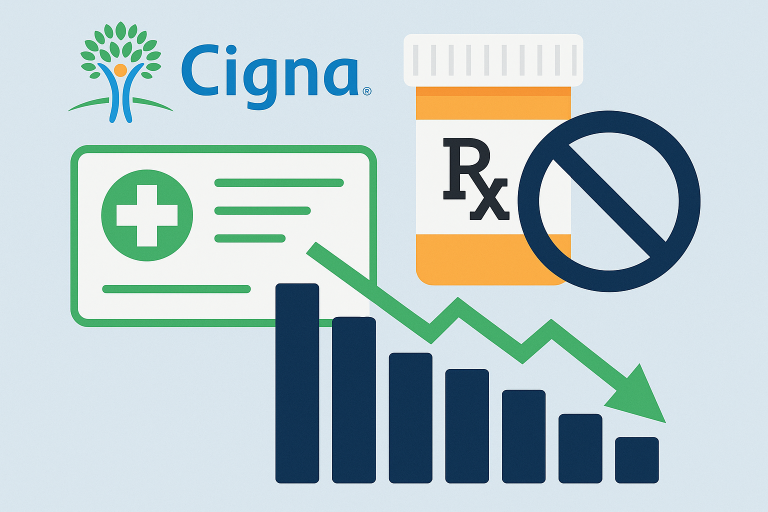Cigna Group’s decision to eliminate prescription drug rebates from many of its health plans marks one of the biggest shifts in the US pharmaceutical supply chain in decades.
The change, set to begin in 2027, according to Bloomberg, will eventually expand across its Express Scripts unit from 2028, replacing rebates with direct discounts for patients at the pharmacy counter.
The move challenges a long-standing system that has shaped how billions flow between drugmakers, insurers, and employers — and it could redefine how Americans pay for their medications.
It also aligns with President Donald Trump’s push for more transparent pricing and lower out-of-pocket costs for consumers.
What are drug rebates and why do they matter?
Pharmacy benefit managers, or PBMs, sit between pharmaceutical companies, pharmacies, and insurers. They negotiate which drugs are covered by insurance plans and how much they cost.
For years, PBMs have relied on rebates — payments drugmakers make to them after a prescription is filled — to secure favourable placement of medicines on insurance lists.
In 2023, the total value of these rebates and other discounts reached $356 billion, according to the Drug Channels Institute. PBMs say most of this money is passed back to employers or insurers to reduce premiums.
But critics argue that patients rarely see the savings directly, especially those on high-deductible plans who often pay full price upfront.
The system has faced growing political and regulatory pressure. Lawmakers accuse PBMs of driving up prices, while drugmakers say rebates act as hidden kickbacks.
The Federal Trade Commission is currently suing Cigna’s Express Scripts, CVS Health’s Caremark, and UnitedHealth’s Optum Rx, claiming their rebate practices inflated the price of insulin. The case is still pending.
How will Cigna’s new model work?
Under Cigna’s new model, patients will receive immediate discounts instead of waiting for rebate adjustments made months later. The rebate-free plan will initially cover about 2 million of its fully insured members in 2027.
From 2028, it will become the default option for Express Scripts clients, though they can still opt to keep rebate-based contracts.
The change does not apply to Medicare or Medicaid, which are government-run programmes. For those with high-deductible private plans, Cigna expects brand-name drugs to become roughly 30% cheaper at the point of sale.
Implementing this model means renegotiating contracts with drugmakers, employers, and health plans.
Cigna’s Express Scripts currently manages drug benefits for about 100 million members, and the company expects half of its employer and health plan clients to adopt the rebate-free model within three years.
Why is this happening now?
The Trump administration, states Bloomberg, has made dismantling the rebate system a central part of its drug-pricing reform agenda. Trump has called PBMs “middlemen” who add no real value and drive up consumer costs.
Earlier this year, Centres for Medicare and Medicaid Services administrator Mehmet Oz urged PBMs to end what he described as the “rebate-slash-kickback system.”
Meanwhile, drugmakers are adapting. Companies such as Pfizer and AstraZeneca have started offering direct-to-consumer discounts on certain medicines, especially weight-loss and chronic disease drugs.
These programmes allow patients paying cash to access the same or lower prices than insurance holders.
Cigna said it will guarantee that its members never pay more than the lowest available price, including those direct cash rates.
It also plans to expand its fair reimbursement initiative for pharmacies to ensure consistent compensation under the new pricing model.
What does it mean for the broader drug market?
Cigna’s change is part of a broader effort by PBMs to stay ahead of potential regulation.
Optum Rx has already pledged to pass all rebates directly to clients, and CVS Caremark is testing models that provide rebates directly to patients at the pharmacy.
Still, rebates will not disappear overnight. Bloomberg states that Cigna expects them to remain “for the foreseeable future” but says the goal is a simpler and more transparent system.
The company has also clarified that it will no longer collect other fees from drugmakers tied to a medicine’s list price — a practice that has raised concerns about conflicts of interest.
Although eliminating rebates could affect how employers manage premium costs, Cigna said it does not expect premiums to rise.
The company believes lowering patient costs at the counter will improve medication adherence and reduce long-term healthcare expenses.
If widely adopted, Cigna’s model could set a precedent for the industry — replacing a decades-old pricing structure with one that prioritises upfront savings over back-end incentives.
For millions of Americans, it could mark the first tangible step toward genuine price transparency in prescription drugs.
The post How Cigna’s rebate-free plan could reshape US drug pricing appeared first on Invezz

